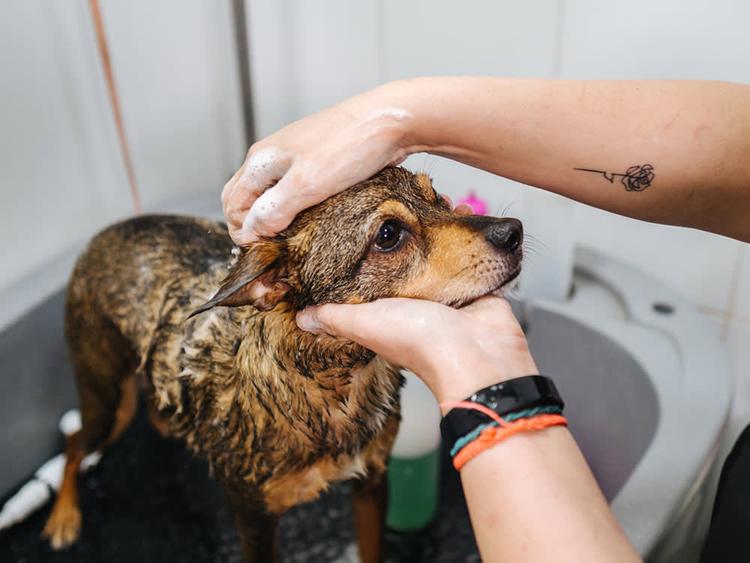A Guide to Adopting a Dog With Heartworms
A positive heartworm diagnosis can sound scary, but experts say there’s no reason to worry.
A positive heartworm diagnosis can sound scary, but experts say there’s no reason to worry.
by Janelle Leeson, | July 29, 2024

Desde El Sur / Stocksy
Warmer winters, natural disasters that displace pets, and increased movement of rescued animals across borders have all contributed to a rise in heartworm disease across the U.S. This means more shelter dogs are testing positive for heartworm disease, leaving heartworm-positive pups in need of loving homes and proper treatment.
A positive heartworm diagnosis (or even a history of heartworms) might raise concerns, but adopting a heartworm-positive dog doesn’t need to be scary. You just have to be up-to-speed on what’s needed for their recovery and how to prevent future infections. Below, experts walk you through the realities of adopting a heartworm-positive dog and explain how to ensure your loveable companion lives a happy, healthy life.
You fell in love with a pup, but they’re heartworm positive or currently being treated for heartworms. Is that a dealbreaker? It shouldn’t be. Megan Miller, manager at Best Friends Animal Society Sanctuary’s Dogtown, reassures us that heartworm-positive dogs:
Aren’t contagious to other pets
Can be treated (and many don’t experience complications)
Can live normal lives when infections are not severe
Deserve loving homes, even if a severe infection means a shorter lifespan
Heartworms (Dirofilaria immitis) are parasitic worms that feed on the blood of animals, including dogs, cats, and ferrets. Once an adult worm infects a host, it lives within the heart, major blood vessels, and lungs, explains Dr. Rebecca Greenstein, DVM, veterinarian at Kleinburg Veterinary Hospital.
Without treatment, adult heartworms can grow to over a foot in length and become deadly. It’s scary stuff but, “It’s not hard to prevent heartworm infections,” says Dr. Elizabeth Clyde, a small-animal veterinarian and a member of the board of directors for the American Heartworm Society (AHS).
“Mosquitos!” cause heartworm in dogs, Dr. Clyde says. As if mosquitos weren’t annoying enough, they can carry heartworm larvae. When they bite a dog, the larvae from the mosquito enter the dog’s bloodstream, where they mature into adult worms — that is, unless the dog is on a year-round parasite preventative.
Heartworms are so damaging because they migrate through the tissue and into the pulmonary vessels (or blood vessels that carry blood from the heart to the lungs).
“The larvae are doing their best to get to the heart,” Dr. Clyde says. “But as the heart beats, it pushes them back into the lungs.” This constant back-and-forth friction damages the vessels, leading to the following symptoms:
Tiring quickly
Collapsing or fainting episodes
Decreased appetite
Weight loss
Heartworms can be treated in dogs, but the damage they’ve caused can’t be undone.
According to AHS, there’s only one drug that’s approved by the U.S. Food and Drug Administration (FDA) for treating heartworms in dogs: Melarsomine (also called Immiticide or Diroban). It’s a series of injections that must be administered by a vet. Melarsomine treats heartworms in dogs in one to three months.
The cost to treat a heartworm-positive dog is about $500 to $1,500. Some shelters can cover this cost, while others cannot.
For instance, Best Friends Animal Society treats heartworm-positive dogs as soon as they arrive at the shelter. Other shelters, including Austin Pets Alive!, wait until the dog is adopted or in foster care to treat the heartworm infection. This reduces stress during recovery and can minimize treatment complications, says Dr. Rachel Gordan, DVM, a veterinarian at Austin Pets Alive!.
When a shelter or rescue can’t cover the cost of heartworm treatment, there are other ways to manage vet costs. These include:
Discussing payment plans and lower-cost appointment options with your vet
Seeking financial assistance from nonprofits or charities
Applying for financing through services such as CareCredit, which allows you to pay for veterinary care over time
Fundraising using platforms like GoFundMe
Melarsomine can have serious side effects, but these risks are significantly minimized when a vet administers the injections correctly. In other words, never give this medication to your dog yourself.
Another risk is that the dead worms can sometimes block blood flow, which is similar to a blood clot. According to AHS, limiting your pup’s exercise and excitement for the six to eight weeks following the last injection can help minimize this risk. This means:
Crate rest and no unsupervised roaming in the house or yard
Short potty walks only, on a leash in the backyard
No playing or training that gets them excited, including limited excitement from other household pets
Miller says Best Friends and their shelter partners always share as much as they know about a dog’s medical and behavioral history with a potential adopter. This includes disclosing if the pup is heartworm-positive, or if they have been treated previously. “Transparency is crucial to successful adoptions — it ensures potential adopters have all the information they need before committing to bringing home a pet,” she says.
If you’re interested in adopting a heartworm-positive dog, here are some important things to consider.
Heartworm disease is treatable, but the damage is irreversible. When heartworm infections are severe, this can limit a dog’s athletic ability and potentially shorten their lifespan.
Treatment can have serious side effects and require strict rest for recovery.
Treatment costs $500 to $1,500, and some shelters may not cover it.
A heartworm-positive dog cannot spread heartworms to another pet or to humans.
Dogs can become reinfected with heartworms if they’re not on year-round preventive medicine.
Heartworm-positive dogs are an at-risk population in desperate need of adopters and foster parents. “Shelters across the country are struggling with overcrowding,” Miller explains. “Sadly, heartworm-positive dogs are the first to be killed when capacity becomes an issue.”
Heartworm is a nasty parasite that can infect both cats and dogs. Unfortunately, treatment is only available for dogs. The good news? Heartworm disease is preventable.
Here’s how to keep your new pet safe from heartworms.
Year-round parasite prevention. No matter where you live, keep your pet on year-round heartworm prevention medication. Most prescription flea medications offer all-in-one protection against fleas, ticks, roundworms, and heartworms.
Get your dog tested. Test your dog annually for heartworms. It’s a simple blood test (around $45 to $100) that your regular vet can do.
In 2023, about one percent of dogs in the U.S. tested for the parasite were shown to be heartworm positive. It’s important to consider that this study may have underestimated the actual number of cases. In addition to untested or untreated heartworm-positive dogs, Dr. Clyde explains that it takes about six months for heartworms to mature and become detectable in tests. This is why some infected dogs might test negative initially. Heartworm is a threat in all 50 states, so prevention no matter where you live is crucial.
You don’t need to worry about a dog passing heartworms to other dogs, Dr. Greenstein says. A mosquito would need to bite an infected dog and then bite the healthy dog to potentially infect them. Parasite preventatives can protect your dog from infection, even if they’re bitten by an infected mosquito.
Adopting Heartworm-Positive Dogs
Have a Heart — Adopt a Heartworm-Positive Dog and Save a Life

Janelle Leeson is a Portland, Oregon-based freelance writer. Her work has been featured in magazines such as Inside Your Dog’s Mind, Inside Your Cat’s Mind, and Paw Print, as well online at Insider Reviews, NBC Select, Shop Today, PetMD, and Daily Paws. She has two adventure cats, a flock of urban chickens, and a soon-to-be-husband who doesn’t mind housing the occasional foster cat — or five.

Adoption Advice

Adoption Advice

Shelters & Rescue

Adoption Advice
Wondering where to go to rescue a pup, and what to do once they’re home? We’ve got all the answers.

Adoption Advice
Short answer: Absolutely. After a little preparation, you’ll find immense ease and satisfaction in opening your home to a sight-impaired pup.

Breed Info
Because you’re never too old to find your bestie.

Shelters & Rescue

Shelters & Rescue

Adoption Advice
While you’ll need to monitor your pet’s blood sugar, it’s not nearly as involved as you’d think.

Breed Info
Pedigreed pups are tied with mixed breeds for some disorders — but mutts reign supreme.

Adoption Advice
Learn more about how you can find a dog shelter that meets your expectations.

Adoption Advice
These studies prove that dogs’ awesomeness is more than just a vibe.